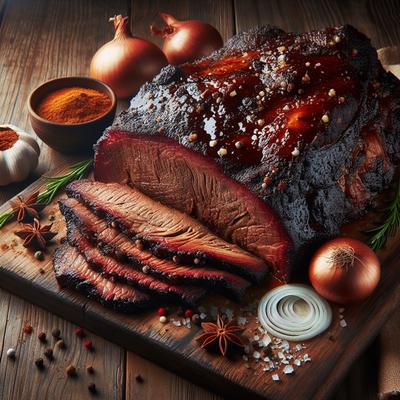Texas Brisket Roast
Experience the smoky, savory essence of the Lone Star State with this Texas Brisket Roast recipe—a show-stopping centerpiece perfect for any barbecue or family gathering. This mouthwatering dish features a perfectly seasoned beef brisket, rubbed with a bold blend of smoked paprika, garlic powder, cayenne, and a hint of brown sugar for a touch of sweetness. Slow-cooked to tender perfection in the oven or smoker, the brisket is basted with a tangy mop sauce made from yellow mustard, apple cider vinegar, and beef broth, ensuring every bite is packed with rich, juicy flavor. Whether you choose to infuse it with the authentic taste of hickory or mesquite wood chips for an extra layer of smokiness or simply let the spices shine, this recipe guarantees a fork-tender brisket with a beautifully caramelized bark. Serve it with classic sides like coleslaw, baked beans, or cornbread, and savor the essence of true Texas barbecue in your own kitchen. Perfect for feeding a crowd, this recipe delivers bold flavors that will have everyone coming back for seconds!
Try SnapCalorie's FREE AI assisted nutrition tracking free in the App store or on Android.

Scan with your phone to download!

Ingredients
- 5 pounds beef brisket
- 2 tablespoons kosher salt
- 2 tablespoons black pepper, freshly ground
- 1 tablespoon smoked paprika
- 1 tablespoon garlic powder
- 1 tablespoon onion powder
- 0.5 teaspoon cayenne pepper
- 1 tablespoon brown sugar
- 2 tablespoons yellow mustard
- 0.5 cup apple cider vinegar
- 1 cup beef broth
- 2 tablespoons olive oil
- 2 cups wood chips (optional, for smoking)
Directions
Step 1
Begin by trimming the brisket, removing any excess fat cap but leaving about 1/4 inch for flavor and moisture retention.
Step 2
In a small bowl, combine kosher salt, black pepper, smoked paprika, garlic powder, onion powder, cayenne pepper, and brown sugar to create a dry rub.
Step 3
Rub the surface of the brisket with olive oil to help the spices bind, then generously coat the brisket with the dry rub, pressing it into the meat. Let the brisket rest at room temperature for about 1 hour or refrigerate overnight for deeper flavor.
Step 4
Preheat your oven to 275°F (135°C). If using a smoker, preheat it to 225°F (107°C) and prepare wood chips for smoking. Hickory or mesquite chips work well for authentic Texas flavor.
Step 5
In a bowl, whisk together yellow mustard, apple cider vinegar, and beef broth. This mixture will act as a mop sauce to baste the brisket during cooking.
Step 6
If using a smoker, place the brisket fat-side up on the smoker grates and smoke for about 6-8 hours, basting every hour with the mop sauce and maintaining a consistent temperature.
Step 7
If using an oven, place the brisket fat-side up in a roasting pan or on a wire rack set over a baking sheet. Cover the brisket with foil, add 1/2 cup of beef broth to the bottom of the pan, and roast in the oven for 6-8 hours. Remove the foil for the last 1-2 hours to allow the bark to develop.
Step 8
The brisket is done when the internal temperature reaches 200°F (93°C) and is tender enough to pull apart with a fork.
Step 9
Let the brisket rest for 30 minutes, covered lightly with foil, to allow the juices to redistribute.
Step 10
Slice the brisket against the grain into thin slices and serve with your favorite barbecue sauce and sides, such as coleslaw, cornbread, or baked beans.
Nutrition Facts
| Serving size | (3217.3g) |
|---|
| Amount per serving | % Daily Value* |
|---|---|
| Calories | 5704.7 |
| Total Fat 303.7g | 0% |
| Saturated Fat 109.8g | 0% |
| Polyunsaturated Fat 13.3g | |
| Cholesterol 2131.9mg | 0% |
| Sodium 13338.1mg | 0% |
| Total Carbohydrate 38.5g | 0% |
| Dietary Fiber 9.3g | 0% |
| Total Sugars 10.8g | |
| Protein 675.4g | 0% |
| Vitamin D 181.4IU | 0% |
| Calcium 403.7mg | 0% |
| Iron 68.5mg | 0% |
| Potassium 7246.2mg | 0% |
Source of Calories
